Pincer grasp activities help your child strengthen their small muscles in preparation for future hand writing. This article gives you 40 fun, Montessori aligned, pincer grasp activities.
Why is this type of grasp important?
Some children are naturally drawn to…well, drawing. (Drawing is one of the most basic pincer grasp activities.)
These kids will likely have little trouble getting their final pencil grasp down pat in time for the school years.
But, there are many children that either don't have the interest, or don't have the confidence to attempt a pencil grasp.
This may be due to not having practice with fine motor skills and/or lack of small and large muscle strength in their dominant hand.
Hand strengthening and pincer grasp refinement is built into most early Montessori activities. That's part of the beauty of Maria Montessori's Method.
But, you don't need any Montessori materials to set up some great pincer grasp activities for your toddler or preschooler.
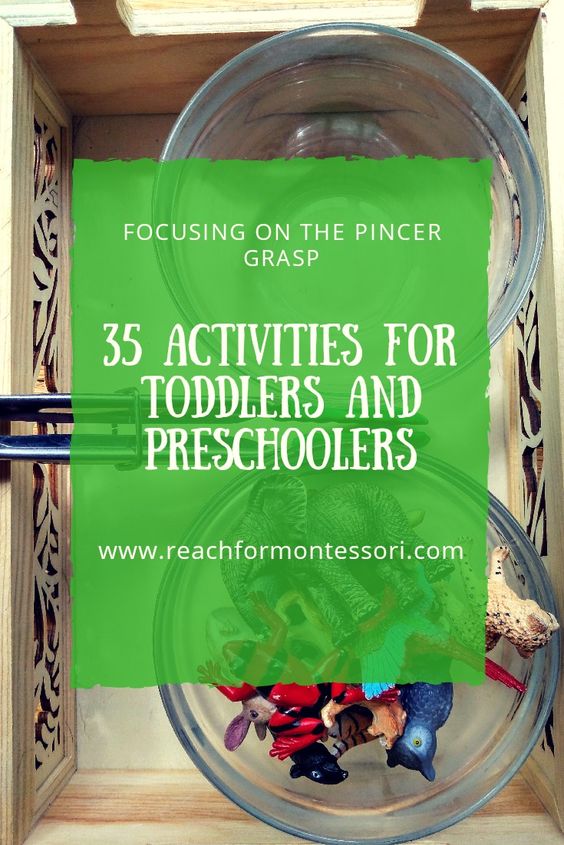
(This post contains affiliate links. Purchasing from these links costs you nothing extra, but sends a few cents our way for website upkeep.)
What is a pincer grasp?
Before we get to the activities, let's talk a little about what the pincer grasp is.
The pincer grasp is the third type of grasp you will notice in the infant period, occurring around 8-10 months.
This is the age when babies become able to pick up small bits of food between their index finger and thumb to more effectively feed themselves.
This is a huge milestone – and a huge stepping stone.
Not only is the pincer grasp important for eating and playing, it is also the first fine-motor building block needed for writing.
There's no need to provide a child with tedious activities to get their muscles strong enough for a pincer grasp.
Fun activities and games, like the ones listed below will do the trick.
So, let's get to it!
40 fun pincer grasp activities for toddlers and preschoolers
Knobbed Puzzles
Large knobs for the toddlers. Small knobs for the preschoolers.
- Montessori Geography Puzzle Sensory Material
- Big Knobbed Geoboard,Montessori Geography Puzzle
- Wooden Material With Base,and different color,shape,size
PlushCraft Purr-FECT Pillow.
I actually purchased this not realizing that it is the perfect pre-writing craft activity. I just looked like so much fun.
- Creates a cozy kitten-shaped pillow
- Fabric by numbers
- No sewing required
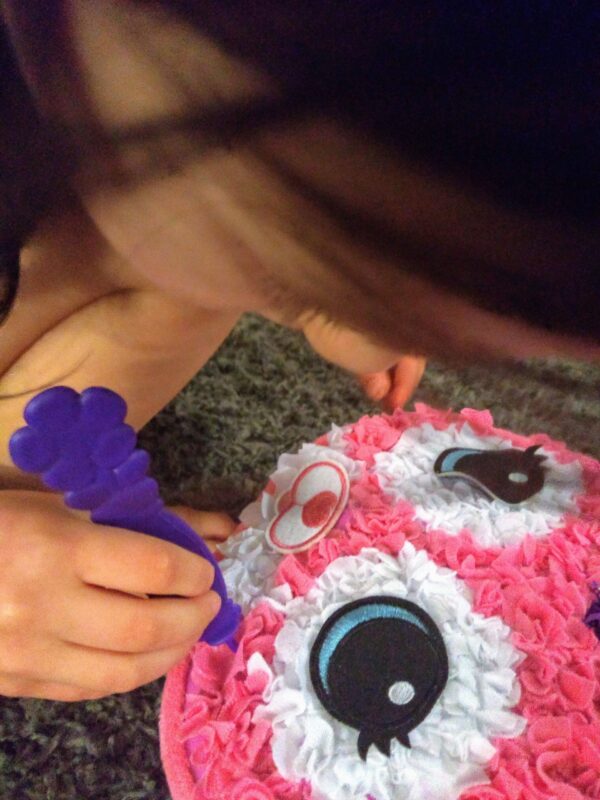
Button Sorting
Your child can do this activity using their hands, but a set of tweezers really works those fine motor skills.
Here is a link on how to present an easy DIY button sorting activity!
Color mixing
You can help your child's pincer grasp by having them use an eye-dropper to color the water with food coloring.
This can be a basic lesson on colors for a young toddler and a lesson on primary and secondary colors for a preschool-aged child.
Clothespin activities
Paint several clothespins fun colors. Have them clip the clothespins on the side of a bowl.
You can present it as a sorting game or a pattern activity.
After your child gets the knack of it (and the hand strength), set up a little clothesline outside or in your house where your child can hang a few items to dry.
There is nothing kids enjoy more than feeling like a working cog in the family machine.
Threading leaves
This activity doesn't have to be reserved for Fall. You can thread leaves throughout the year. What a wonderful lesson in the changing of the seasons.
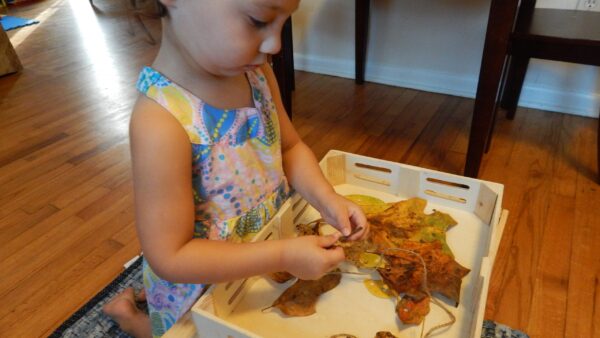
Lacing cards
Lacing cards are great for working on fine motor skills while you're traveling, at a restaurant, or in the waiting room at a doctor's office.
- Skills: Strengthens fine motor skills, boosts creativity and…
- Age: 5+.
- Includes 5 large, shaped lacing cards and five 48″ color laces.
Pushing pom-poms into a water bottles
This is a fun and budget-friendly fine motor activity. It's great for kids in various play schemas, as well.
Sticking pipe cleaners through colander holes
This can be done with either pipe cleaners or uncooked spaghetti. Just turn the colander over and place a pile of pipe cleaners next to it.
You're little one will figure out what to do.
Transferring marbles with tongs
For this activity, you just need some marbles, a set of tongs, and a Duplo block base turned upside down. It's challenging and fun.
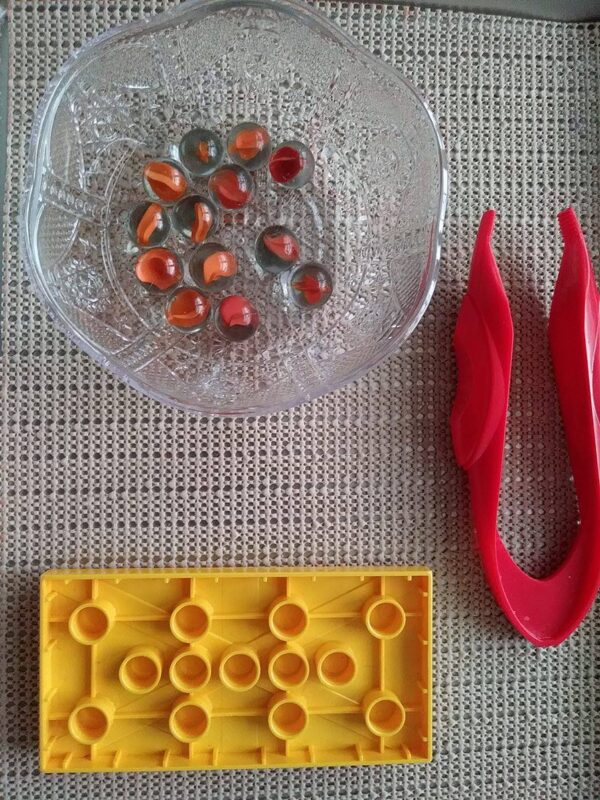
Cutting with scissors
You can simply give your child a paper and some child-friendly scissors and let them get creative or you can draw lines or designs on the paper for more of a challenge.
Painting
Any process art activity that involves painting will be beneficial to encouraging the strength needed for a pincer grasp.
Coloring
Just as with painting, process art is the way to go here.
Juicing
This is a favorite of my daughter's. She can make her very own fresh squeezed orange juice from start to finish.
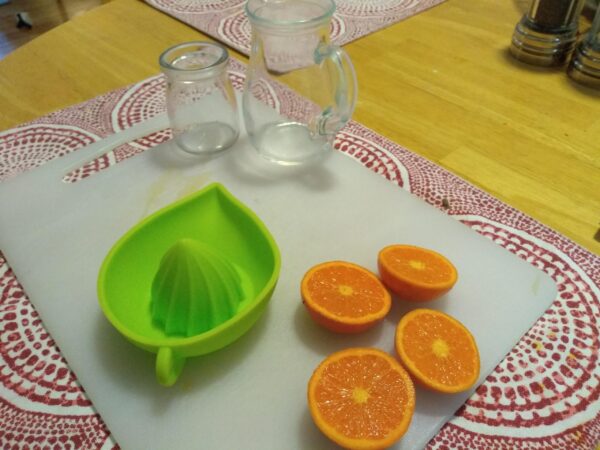
All you need is a cutting board, a hand juicer, some oranges (Clementines are easier for the younger kids.), a child-size pitcher, and a small glass.
- This citrus reamer plastic is suitable for small and big orange,…
- This hand held lemon reamer provides a secure grip allowing you…
- The citrus hand press is perfect for fresh-squeezed orange juice….
Bubble wrap
Instead of tossing it or discouraging your kids from playing with it, let them at it.
- Provides ideal cushion protection for delicate items during…
- Lightweight, neat, clean, non-scratching and recyclable
- 16 in. x 15 ft. roll
Cooking activities
Anything that requires whisking, chopping, or mixing gets those hand muscles stronger.
Child-size cooking utensils are preferable for these activities.
Learning Chopsticks
These are great for eating, as well as planned pincer grasp activities like transferring.
- What you will get: for this package you will receive 5 pairs…
- Reliable polymer material: our chopstick helpers are made of…
- Junior chopsticks: with this chopstick trainer, you can easily…
Window washing
A spray bottle and a squeegee will help strengthen those small muscles used for the pincer grasp. This a classic Practical Life Activity.
Playing with Play-Doh
Play-Doh provides a nice sensory experience for children and it's a great pincer grasp activity.
- GREAT REFILL OR STARTER PLAY-DOH SET: Whether your child is just…
- SHAPING IMAGINATION: From building their own rainbow to mixing…
- 10 PLAY-DOH CANS: This Play-Doh set includes 2-ounce cans of red,…
Opening and closing tops to bottles and jars
Your child might have more fun with his than you expect. You can give them a series of lids and containers to match.
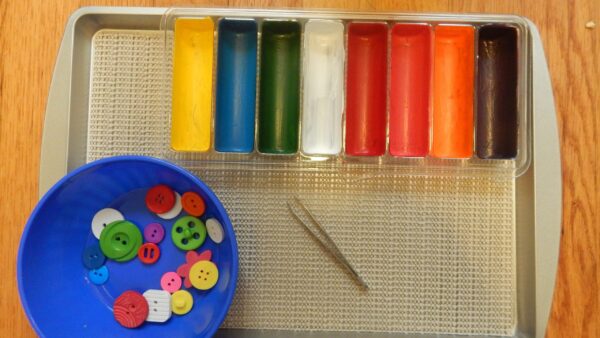
Transferring uncooked rice from one bowl to another using fingers or spoon
This can be done in a sensory bin or in bowls.
Operation (Hasbro)
This is a classic game that encourages a child's hand muscles.
- CLASSIC OPERATION GAMEPLAY: A favorite kids game for generations…
- SKILL AND COORDINATION: In this fun game for kids, players use…
- COLLECT MOST MONEY TO WIN: Earn money for every successful…
Etch A Sketch
Etch A Sketches are great for encouraging creativity, as well as hand strength.
- MAGIC SCREEN: It’s fun and easy to create with Etch A Sketch…
- SHAKE TO ERASE: When you’re finished a drawing and ready to…
- CLASSIC DRAWING TOY: For over 60 years, children and adults of…
Lite-Brite
The tiny pegs of the Lite Brite are challenging to grasp and great for building finger strength.
- 206 Classic Pegs: This set includes 206 glowing pegs in 6…
- 6 Design Templates: There are 6 easy-to-follow templates…
- 4 Different Light Modes: There are 4 different light modes that…
Sticker books
Peeling stickers is great for the muscles involved in the pincer grasp.
- Add the pleasure of sticker play to your child's favorite themes
- 5 scenes, 150+ reusable stickers
- Measures 14″ x 11″
Pick Up Sticks (Game)
This is a fun game that involves concentration, control of movement, and fine motor skills.
- Fun, classic addition for your game collection
- Try to move and collect the colorful sticks carefully to win
- Easy to learn, quick to play
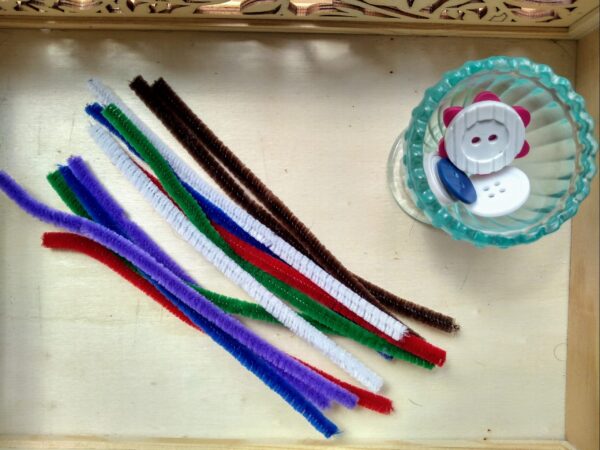
Drawing with sidewalk chalk
- Outdoor chalk tools for boys and girls ages four and up; Great…
- Washable: perfect for driveway art and outdoor designs; Safe use…
- Strong chalk sticks that don't break or roll down the driveway;…
Pouring activities
Pouring often gets overlooked when it comes to building hand strength. Children really enjoy pouring activities, though – take advantage of this.
Even just pouring water from cup to cup is fun.
Transferring miniature animals with tongs
Transfer small animal figurines from bowl to bowl.
- Go Wild: 12 different miniature wild animals; 60 fun animal toys…
- Fun Sized: Small figurines with bold colors and accurate details!
- Wild Party Idea: Great goodie bag stuffers for a kids’…
Threading pipe-cleaners through button holes
I actually can't take credit for this one. I found that my 4 year old had threaded some pipe-cleaners through several buttons and left them on the kitchen table.
I thought I'd pass the activity onto you.
Matching locks and keys
Lock and key activities are great for the pincer grasp muscles.
- Hands-on Learning: Children’s Potential for Learning Can be…
- Fine Motors Skills: Helping Children Develop Coordination, Visual…
- Practical Life Skills: Helping Kids Learn Use Keys to Lock and…
Gardening activities
Your child will need to use a pincer grasp to pick up and plant the seeds and using gardening tools is sure to strengthen their hands.
Small gardening tools are recommended for this.
You can start with a simple plant care activity and then move onto something more challenging like planting a butterfly garden.
Peeling carrots
Peeling carrots or potatoes is both fun and great for pincer grasp muscles.
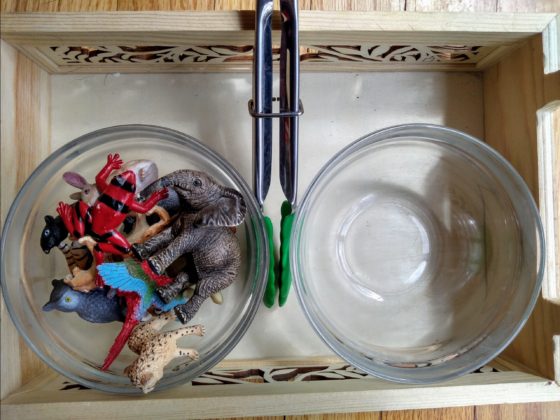
Tying knots
Tying knots is sometimes too challenging for young children, but if you find that your preschooler is interested, learning simple knots is great for the small muscles of the hand.
- Tilton, Buck (Author)
- English (Publication Language)
- 136 Pages – 06/01/2022 (Publication Date) – Falcon Guides…
Peeling tape from tray/floor/sidewalk
All you need for this pincer grasp strengthening activity is some painters tape. It can be done inside our outside.
- Use-On Surfaces: Designed For Use On Multiple Surfaces Such As…
- PAINT LINES: Edge-Lock Technology seals out paint to deliver…
- Days Clean Removal: 21-Day Interior And Exterior Clean Removal…
Making Oobleck
This is a really fun fine motor sensory activity for when you're in the mood to get messy.
Flower arranging
Grab a glass, vase, or jar and collect some real or fake flowers. This activity has so many benefits.
Spooning Beans from bowl to bowl
Most folks already have spoons, fried beans, and bowls at home. This is an easy activity to set up.
Paper Tearing activities
If your child is a sensory-seeker, this might be the perfect pincer grasp strengthening activity.
Sensory table play
Almost every activity done at sensory tables or light tables involves fine motor skills.
In addition to these activities, Montessori play schema activities and loose part play all involve fine motor elements.
And of course, turn off the TV and tuck away the tablets. Time spent in front of a screen is time lost for refining fine motor skills!
I personally endorse every activity in this article. My daughter was quite resistant to the idea of writing. Getting her pincer grasp strong made all the difference.
Cheers and don't forget to subscribe!
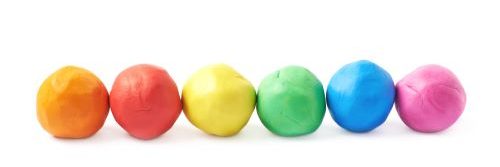

















Pingback: Why does Montessori Teach Writing Before Reading? — Parenting with Purpose
Pingback: 5 Fun and Easy Fall Activities Your Kids Will Love! — Parenting with Purpose